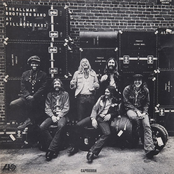At Fillmore East

Biography
Whereas most great live rock albums are about energy, At Fillmore East is like a great live jazz session, where the pleasure comes from the musicians' interaction and playing. The great thing about that is, the original album that brought the Allmans so much acclaim is as notable for its clever studio editing as it is for its performances. Producer Tom Dowd skillfully trimmed some of the performances down to relatively concise running time (edits later restored on the double-disc set The Fillmor...
Whereas most great live rock albums are about energy, At Fillmore East is like a great live jazz session, where the pleasure comes from the musicians' interaction and playing. The great thing about that is, the original album that brought the Allmans so much acclaim is as notable for its clever studio editing as it is for its performances. Producer Tom Dowd skillfully trimmed some of the performances down to relatively concise running time (edits later restored on the double-disc set The Fillmore Concerts), at times condensing several performances into one track. Far from being a sacrilege, this tactic helps present the Allmans in their best light, since even if the music isn't necessarily concise (three tracks run over ten minutes, with two in the 20-minute range), it does showcase the group's terrific instrumental interplay, letting each member (but particularly guitarist Duane and keyboardist/vocalist Gregg) shine. Even after the release of the unedited concerts, this original double album (single CD) remains the pinnacle of the Allmans and Southern rock at its most elastic, bluesy, and jazzy. [In 2004, Mercury reissued At Fillmore East as a hybrid SACD, playable in both regular CD players and Super Audio CD players. On each of the layers, the remastered sound is spectacular, a considerable upgrade from the initial CD pressings.] A good idea that worked out even better, with one small caveat. The Fillmore Concerts is made up of performances from the two Fillmore shows that originally comprised Live at the Fillmore East and the concert portions of Eat a Peach, plus one track ("One Way Out") from a Fillmore show from a couple of months later. The 16-track masters from each show are transferred to digital and remixed by original producer Tom Dowd. The sound is sterling and the two-hour-plus running time makes this a dream for fans of the band, as well as an improvement on the original releases of this material. It is also a slightly less honest release, where "In Memory of Elizabeth Reed" is concerned — Dowd edited the version here together from two different performances, first and second shows, the dividing line being where Duane Allman's solo comes in. Not that this is the only concert album where this kind of editing has been done, but the original Live at the Fillmore contained a single take of the song, and some purists may prefer that. Otherwise, this set runs circles around more than 99 percent of the guitar albums ever released, with breathtaking sound (which, unlike the similarly conceived but less effective Derek & the Dominos Live at the Fillmore, loses none of its bite), and most fans might as well start here. Read more on Last.fm. User-contributed text is available under the Creative Commons By-SA License; additional terms may apply.
